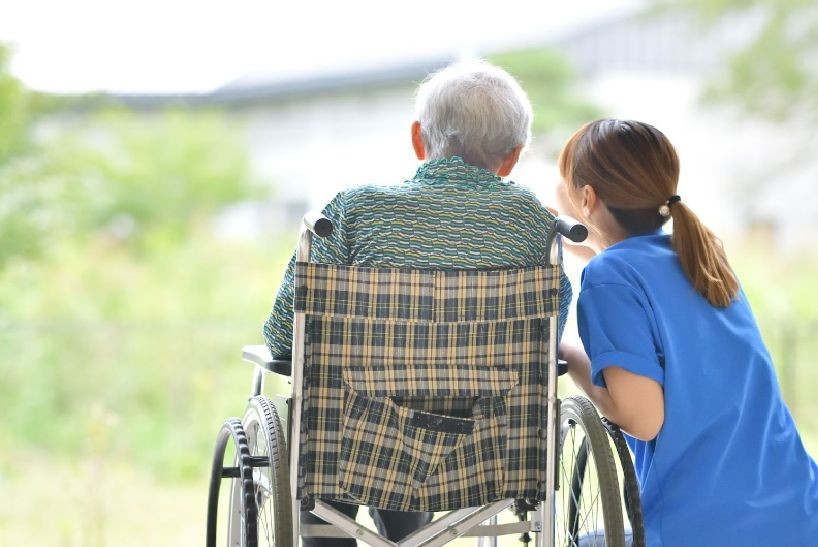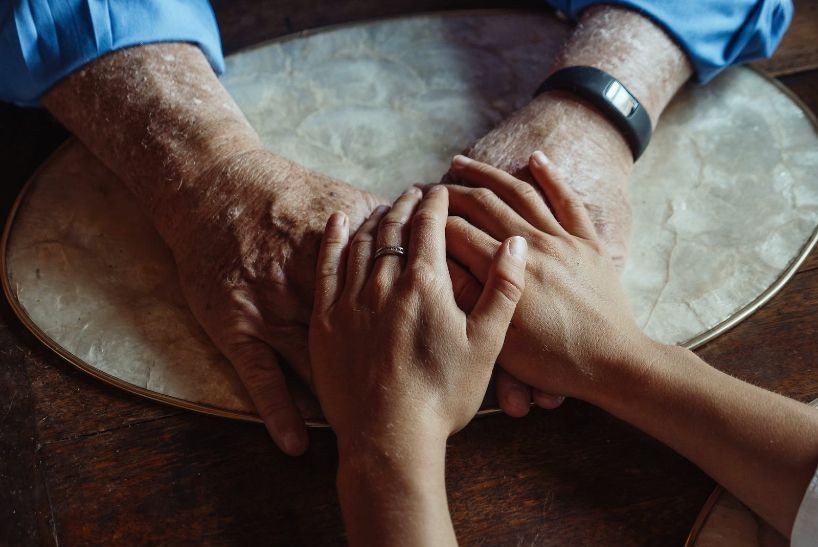Spitex and ATC (acute transitional care)
Specialist topics
Spitex and AÜP (acute transitional care)
When patients return home after a long stay in hospital, they often have to find their feet again. They need time to resume their usual daily routine. They may need to make a few adjustments according to their current condition. Acute transitional care provides support in these cases.

It should in no way be seen as a bridging measure until admission to a care or rehabilitation facility. It is intended to increase self-care skills to such an extent that clients can manage on their own again in their familiar environment. The permanent return to their own home is the top priority. A subsequent stay in other facilities should be avoided as far as possible.
What does acute transitional care do?
The aim of acute transitional care is to make it easier for clients to return to their familiar surroundings and everyday life. It creates a transition that meets both their physical and psychological needs.
It can be used whenever the current health problems are fully known and the condition has been stabilized. Further diagnostic and therapeutic measures must no longer be necessary. There must also be no need for rehabilitation.
If these criteria are met, the hospital doctors will order acute transitional care if necessary. The client's individual condition determines how long it will last. This is followed by a needs assessment by Spitex in mutual consultation.
The average cost of acute transitional care does not exceed two hours per 24 hours. If more extensive care is required, transitional care cannot be offered. Once the needs assessment has been carried out, the specialists draw up a care plan. It contains the measures that are necessary to achieve the goals.
If the chosen Spitex cannot provide all the necessary services itself, it works together with other organizations. It is also possible to transfer the entire contract to another Spitex. The modalities and financing are regulated by a service agreement between the municipalities and Spitex organizations. This is done in accordance with cantonal legislation.
Additional services
If additional medical or therapeutic treatments are necessary, these can be provided as individual services on an outpatient basis. They are not part of acute transitional care. This also applies to domestic services or meal services, among other things.
However, it is important to note that domestic assistance in particular is often of great importance. It is often essential so that clients can settle back into their homes in peace. However, they must apply for and pay for such services themselves. They are not part of the mandatory benefits under the KVG.
What requirements must outpatient care fulfill for the provision of acute transitional care?

The legal basis of the respective canton determines whether a Spitex organization is allowed to provide acute transitional care or not. The first decisive factor is, of course, whether the Spitex organization can provide the necessary services. If this is not the case, it must form supra-regional teams together with other organizations. Otherwise, the canton will not issue a license.
Of course, the nursing staff must also have the necessary skills. Comprehensive knowledge of outpatient care, trained handling of various clinical pictures and social skills are the top priorities here.
An infrastructure that enables patient documentation and care planning must also be in place. Only in this way can the services provided to clients be accurately documented, invoiced and passed on to the health insurance companies.
Not to be forgotten are organizational requirements such as a telephone presence - at least within the framework of the cantonal requirements. Clients must be able to contact Spitex directly if they have any questions or concerns.
There should also be no restriction on the number of visits per day and per client. Only then can each person receive the support they really need to return to their everyday lives.
How long does acute transitional care last?

Clients can take advantage of acute transitional care for a maximum of 14 days. However, this period is not always sufficient. This is often the case for the following groups of people:
- Elderly people
- People with multimorbidity
- people with dementia
- People without a social environment
What is needed is a way of providing these and other groups of people with longer-term support. However, a change in the law would be necessary to extend acute transitional care. The main issue here is the cost.
Clients would have to pay the full cost of meals and accommodation themselves, as health insurers only cover the cost of care. This results in higher costs than a hospital stay, which costs CHF 15 per day.
According to current offers, patients would currently have to pay CHF 150 to 200 per day for extended acute transitional care. For this reason, many people decide against these services. However, this decision can have consequences such as an extended hospital stay. It can also result in direct admission to a care facility.
In such cases, the current transitional care is doomed to failure from the outset. It cannot shorten the stay in hospital to a minimum. At the same time, it is not possible to fully address the comprehensive needs of the clients.
Meaningful transitional care of a sufficient duration is therefore currently undermined by the fact that the costs of the stay are not covered. As a result, other areas, such as inpatient rehabilitation facilities, are more heavily burdened.
Approaches for longer-lasting acute transitional care

Based on current statistics, the duration of acute transitional care should be extended to at least four weeks. Of course, this should only be done if the need for an extension can be proven.
It is also important that the possibility of this transitional care becomes better known among the medical profession. Ideally, general practitioners, and not just hospitals, will also be able to apply for this in future. This should be possible within a short period of time after discharge from hospital.
Of course, the costs should not be forgotten either. At the very least, the cantons and health insurers should make payments for inpatient acute transitional care - just as they do for hospital stays. This would mean that clients would only have to pay CHF 15 per day. Transitional care would then no longer be a question of private assets.
What are the advantages of acute transitional care for various bodies?
It is not only the clients themselves who benefit from such changes. Hospitals are also relieved, as they have to reckon with fewer overlong stays or repeat admissions. The same applies to nursing homes. Here, the number of premature admissions would be reduced.
There are also advantages for health insurance companies. They can rely on their policyholders being prepared for their return home in the best possible way. No case managers are required for this. Health insurers also benefit financially, as extended hospital stays or rehabilitation result in higher costs that they would have to bear.
Last but not least, there are also various advantages for hospitals, clinics and other facilities that provide inpatient acute transitional care. People who recover have a positive influence on staff and other patients.
They are a ray of hope that motivates and shows that things can get better again. This can provide mental support, especially for patients who have been treated in hospital for a very long time.
How to find the right Spitex for acute transitional care

At OPAN®, we can help you find a Spitex in your area that meets the needs of your relative. Simply enter the desired zip code and various organizations will be displayed. Now you have a free choice.
We will be happy to help you and answer any questions you may have. Just get in touch with us!
